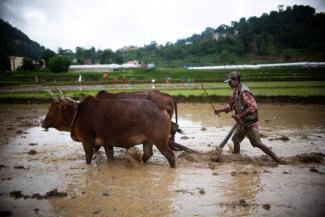Approaches
Industrial agriculture has failed

It offers farmers a chance to dispense with costly agrochemical products and means a new variety of local, healthy food products for consumers. Stepping away from imports would also mean a sharp reduction in nutrient-poor grain crops such as maize or rice as well as promoting self-sufficiency, which cushions (price) crises for families.
At the latest session of the UN Committee on World Food Security (CFS) in October 2022, millions of farmers and their representatives demanded this transition to a different, post-fossil food system as their contribution to solving the food price and hunger crisis. Industrialised countries must also accept and support the concept of food sovereignty (CSIPM, 2022).
It is unacceptable that, within the framework of the GAFS food initiative (Global Alliance for Food Security) initiated by the German Federal Ministry for Economic Cooperation and Development (BMZ), the World Bank plans to make $ 30 billion in loans available to developing countries to buy fertiliser for upcoming harvests. Ultimately, this outlay will mainly boost the profits of big agribusiness. Part of the medium-term support provided needs to be used to promote the kind of agroecological transition that the BMZ itself, along with development organisations such as Brot für die Welt (Bread for the World), have been promoting and supporting for years.
But the industrialised world also needs to transform its agriculture so that, after a hopefully early end to the food price crisis and to Russia’s unscrupulous weaponisation of hunger, subsidised grain, milk and meat from the EU do not flood markets again in the Global South. This disrupts local agricultural production and pushes small farmers out of their markets.
Change also needed in EU agricultural policy
This also necessitates changes in the trade system so that developing countries are not forced by World Trade Organization (WTO) rules or bilateral agreements to keep their markets open to EU products. This is the only way they can protect local production. Developing countries also need to be allowed to pay subsidies to encourage production and to form public stocks to mitigate price and volume crises. Egypt and India have shown in the current crisis that price-support programmes of this kind have helped the poorest but are not sufficient to prevent a rise in hunger if all foodstuffs that need to be purchased become more expensive.
Criticising countries in such situations for imposing export restrictions to prevent their subsidised grain from furnishing profits for traders on the world market smacks of hypocrisy. In June, the agriculture ministers of the seven leading Western industrialised countries (G7) criticised India’s decision to ban the export of wheat with immediate effect.
If the United States, Canada, France or Germany really want more export volumes to combat the high price of wheat, speculators or Putin, they have millions of tons of grain currently used for animal feed or fuel that could be allocated to human food. This may be sorely needed if Russia again obstructs wheat production in Ukraine or if next year’s harvests around the world – as many experts predict – are a great deal lower due to high fertiliser prices.
The fact that associations and big agribusiness are instead exploiting the global food and price crisis to pressure Europe and Germany to step up energy-intensive production and demand that even the slightest progress towards sustainable restructuring of European agriculture should be rolled back is not only shameless lobbying; it is the surest way to bring on the next hunger, energy and price crisis.
Reference
Civil society and Indigenous People’s Mechanism for Relations with the Committee on World Food Security (CSIPM), 2022: Voices from the ground 2: transformative solutions to the global systemic food crises. Rome, FAO Headquarters.
https://www.csm4cfs.org/wp-content/uploads/2022/09/layout-CSIPM-summary-EN.pdf
Francisco Marí is a consultant on global nutrition, agricultural trade and maritime policy at Brot für die Welt (Bread for the World).
francisco.mari@brot-fuer-die-welt.de













